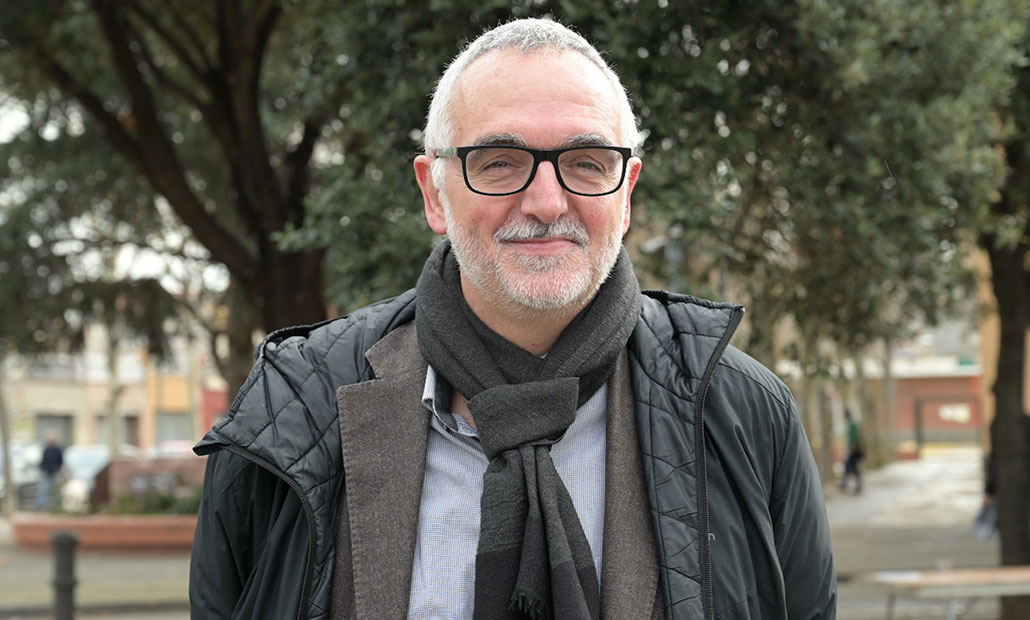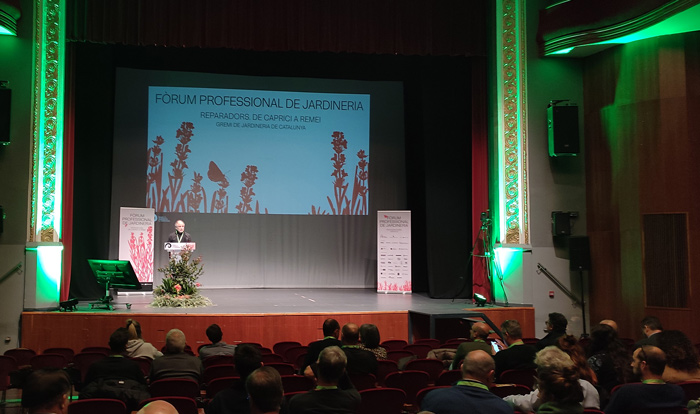Professional Web Portal and Printed Directory about Companies, Products and Services from the Horticulture, Gardening and Associated Markets.
INTERVIEW WITH MIQUEL MARÍN, PRESIDENT OF THE GREMI DE JARDINERIA

The gardening sector of Catalonia recently met in the municipality of Mollerussa, Lleida, at the Fòrum Professional de Jardineria , organized by the Gremi de Jardineria de Catalunya . GuíaVerde interviews its president, Miquel Marín , to find out what his assessment of the event is and to analyze the current situation of the sector that is facing a serious drought crisis.
Recently, they held their last Professional Gardening Forum in Mollerussa with the attendance of more than 150 people. What is your assessment of this edition?
We are happy, it has been a success, because we have maintained the number of attendees. The day included a dozen conferences, workshops and round tables and also included an exhibition space with around thirty sponsoring companies of the Gardening Guild of Catalonia, related to the sector.
It is important to highlight that, in the current context of drought in Catalonia, we decided to hold the event in Mollerussa as part of our commitment to cover the entire territory, and it was also important to be in Lleida. In addition, we held the Forum coinciding with the agricultural machinery fair and that gave us visibility, since people who went to the fair were able to see our event and the Catskills contest. We have felt very well welcomed by both Fira de Mollerussa and the Mollerusa City Council.

A moment from the celebration of the Gardening Forum.
As you already mentioned, the Catskills have once again welcomed young people training in this profession to demonstrate their skills. How do you see the generational change in the sector?
The holding of the Catskills competition, in collaboration with the Department of Education of the Generalitat of Catalonia and the local Institute, in this case the IES Mollerussa, has significant importance for various reasons. Firstly, it facilitates rapprochement between companies and educational centers, promoting a synergy that benefits both students and the professional sector. Secondly, it gives students the opportunity to put their knowledge and skills into practice in a real environment, by creating a garden, this year with a project of specific dimensions (3m x 3m), and with the novelty of being evaluated by active professionals in the business field.
From a training and institutional point of view, this experience is extremely enriching. Participating students are selected by their respective schools, thus guaranteeing a high level of competition. The final results are a clear testament to the quality and commitment of the participants. For me, the participation of 11 schools from all over Catalonia reflects the positive impact and interest generated by this initiative.
Catalonia is suffering from a serious drought and as it could not be otherwise, it has been a very present issue at the Forum. In fact, this year's theme was “Repairers. From whim to remedy”, highlighting gardening as an essential tool in the face of the climate emergency. How is the sector experiencing this situation? Have you felt listened to by the administration?
The sector is bad and it is going to get worse because it is not raining. Until now we have maintained a certain dynamic of works that the companies had in their portfolio, but right now in the areas affected by the emergency decree the use of any type of water for irrigation is prohibited, so basically all gardening projects have been stopped or suspended. It worries a lot. The situation is critical.
Within the framework of the Gardening Forum there was a very interesting discussion table, where three politicians from the local administration participated and debated the municipal management of green spaces in an environment of water crisis, and it was interesting to see that we agreed on many points. Because, it is true that gardening has to be more sustainable and water efficient, but it is also true that in a context of climate crisis like the current one, gardening is not a luxury, but a necessity. It is necessary to guarantee the survival of green spaces, since they are essential climatic refuges for the health and well-being of citizens and the biodiversity of the environment. We cannot understand that, having non-potable water, which could be used for irrigation, is being used to wash the streets. I am clear that green spaces cannot be part of the problem, but rather part of the solution.
For this reason, we continue to insist that where there is non-potable water it can be used for the survival of green areas, but we are encountering silence from the administration. There are areas of Barcelona where the water table is very high and where there are weirs that fill quickly, water that is finally thrown into the sea and could be reused. Yes, it is true that for ERTES due to force majeure the administration has given us all the support, but we continue working to find solutions for self-employed professionals, because they cannot benefit from this measure and need direct financial aid.
To face future water crises, what long-term actions should the sector promote and which should the administration?
To face future water crises, both the sector and the administration must promote a series of long-term actions. Since the 2008 drought, the sector has made significant progress in this regard. Currently, it is possible to design and maintain highly efficient gardens in the use of water, through the implementation of measures such as the installation of tanks for collecting rainwater, drip irrigation systems, selection of species adapted to local climates, and the use of pine bark blankets, among other practices. This transformation is reflected in a considerable reduction in water consumption, going from 7%-8% to 4%, and up to an estimated 2% with the reduction or replacement of grass areas. Although there is room for improvement, it is undeniable that the gardening sector has proven to be quite efficient in terms of water.
As a measure to address future water crises, the Gardening Guild of Catalonia has presented a proposal that was approved in the Parliament of Catalonia: the implementation of a water efficiency certificate for gardens and green areas. This certificate represents a crucial tool that will allow professionals in the sector and citizens to commit to the improvement and adaptation of our green spaces. Its objective is to encourage the transition towards gardens that require less water, which will help mitigate the impact of restrictions during drought episodes. It is essential that the administration supports this initiative and actively promotes the adoption of the certificate.
Leaving aside the problem of drought, what are the other challenges facing the sector?
In addition to the challenge of drought, the sector faces other significant challenges. One of the most important is the need to continue raising awareness among citizens about the crucial role that gardening plays in a climate emergency context. It is essential to understand that green spaces are no longer a luxury, but a necessity. These spaces are not only essential for the conservation of biodiversity, but also contribute significantly to people's physical and mental health. During the COVID-19 pandemic, the importance of contact with nature and urban green areas for our well-being became clear, so it is essential that society understands that we cannot let vegetation lose in any way.
This situation shows the importance of associating, of having valid interlocutors before the administration.
Totally agree. The importance of associating and having valid interlocutors with the administration is evident in situations like this. I completely agree that the motto 'unity is strength' is more than accurate. While as individuals we can achieve certain goals, it is as a collective that we can achieve more ambitious goals. It is crucial to work together to strengthen and promote our sector, since only in this way can we achieve the objectives that dignify our profession and make our companies more competitive.
As president of the Gardening Guild of Catalonia, in collaboration with the Board of Directors, we strive daily to represent and defend the interests of the sector before the different entities and administrations. Our objective is to dignify the profession and increase the competitiveness of companies in the sector. But an association like ours can only have a significant impact if the associated people and companies actively contribute, expressing their concerns and contributing ideas. Therefore, I encourage everyone to understand that joining an association is a good investment.

Family photo of the participants in the Catskills.